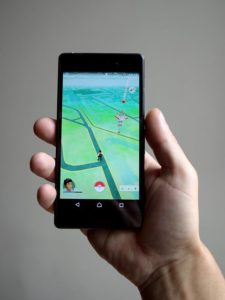Wearable technologies, like smartphones and smartwatches, allow us to use location-based services to “check in,” to establish routes and routines, and to discover nearby activities. But how do these new technologies affect the way we make sense of urban spaces?
WRD Professor Jason Kalin and his colleague, Professor Jordan Frith of the University of North Texas, recently explored this question through a collaborative research project. Kalin’s areas of expertise are in rhetorical theory—visual, digital, and material rhetorics—and memory studies. Frith’s research focuses on issues of space, place, and mobility in media.
In their article, “Wearing the City: Memory P(a)laces, Smartphones, and the Rhetorical Invention of Embodied Space,” published in the June 2016 issue of Rhetoric Society Quarterly, Kalin and Frith discuss palaces of memory, which allowed early rhetors to organize and access knowledge. Today, mobile media users are creating what they call, “hybrid (physical-digital) palaces of memory,” to record and mediate their movements throughout the city. In doing so, users are “not only [physically] inhabiting, but also [digitally] inventing the city.”
Kalin and Frith argue that location-based services establish how users come to use, understand, and embody the city around them. Users feed digital information into physical spaces—images of food and travel destinations, geotags and check-ins, favorite location categories (i.e. bars or retail), reviews, and sometimes even contact information. These digital associations form affective responses to a specific place and guide the user in future interactions with that space.
Both professors have worked together previously. This project, as well as a previous article published in the journal Space and Culture, “Here, I Used to Be: Mobile Media and Practices of Place-Based Digital Memory, combine their areas of expertise, examining how practices of memory have changed with mobile media technologies.
In addition to his research, Professor Kalin has developed courses on these topics for students at DePaul. For example, he teaches a course called “Walking Chicago: A History in Footsteps,” for DePaul’s Chicago Quarter program. Throughout the quarter, students walk around Chicago, pausing often to write, learning about its neighborhoods and their histories, while also learning theories about walking in cities, embodiment, urban planning, and mapping.
Professor Kalin is currently at work on a project that focuses on the experience of walking through alleys. Chicago has about 1900 miles of alleys, and calls itself as the alley capital of the US. He is interested in what is going on in these alleys and the sensory experiences to be found there.

MA in WRD students interested to learn more about issues at the intersection of new media technologies and rhetorical theory can be on the lookout for Professor Kalin’s graduate course, New Media, Old Media, and his topics courses, like The Rhetoric of Memory. Undergraduates can take courses frequently taught by Professor Kalin, including WRD 261: Digital Culture and WRD 363: Visual Rhetoric.


